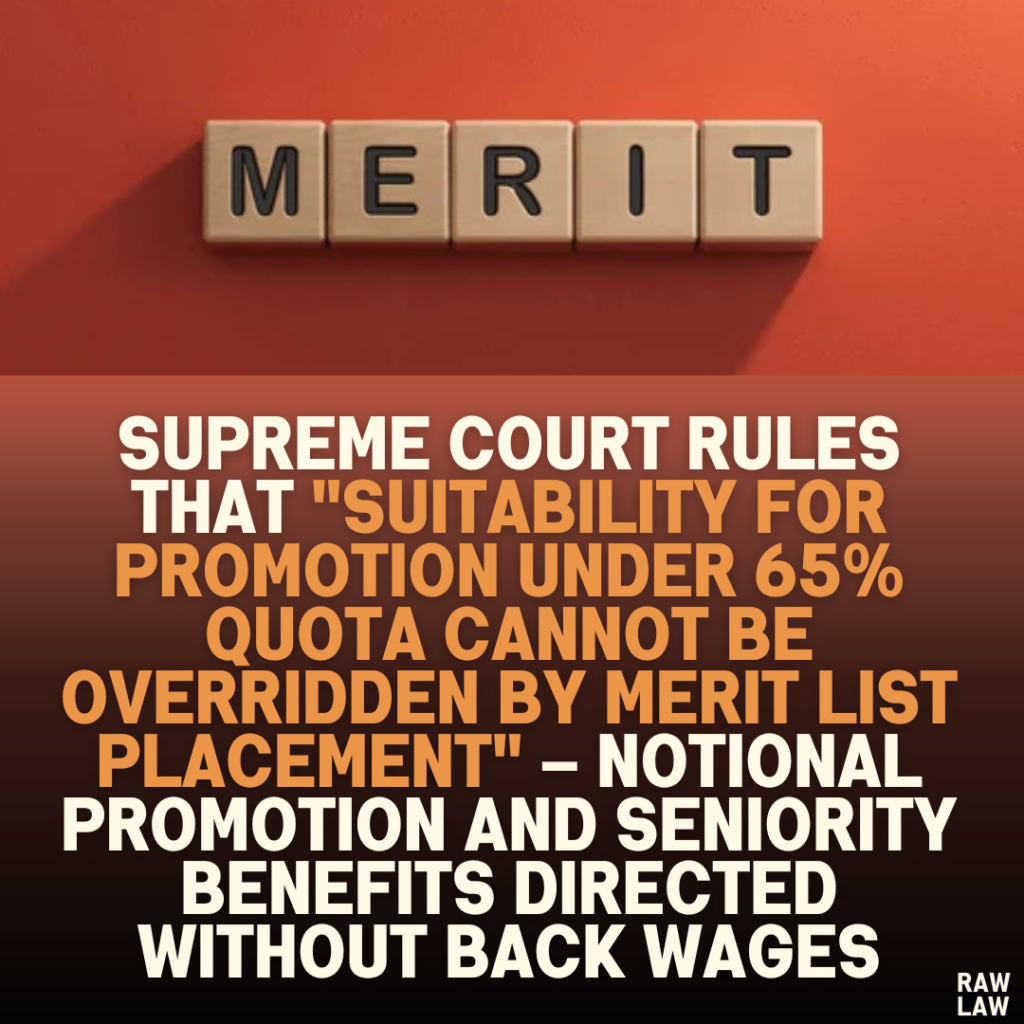1. Court’s Decision:
- The Supreme Court overturned the High Court of Jharkhand’s decision to deny the appellants’ relief.
- The Court held that the appellants, who had qualified the suitability test, could not be denied promotion solely due to their lower ranking in the merit list.
- Directed that the appellants be granted notional promotion effective from the date their peers were promoted (per the notification dated May 30, 2019).
- The appellants were awarded consequential service benefits, including seniority, increments, and notional pay fixation. However, back wages were denied.
2. Facts:
- The appellants were judicial officers in the State of Jharkhand.
- Appellant No. 1 was promoted to Civil Judge (Senior Division) in 2014.
- Appellant Nos. 2 and 3 were promoted to Civil Judge (Senior Division) in 2016.
- A notification dated May 30, 2019, promoted certain private respondents to District Judge posts in the Jharkhand Superior Judicial Service.
- The appellants, who participated in the selection process and qualified the suitability test, were excluded from promotion due to lower scores compared to the respondents.
- The appellants secured more than the minimum qualifying marks (40 marks) in the suitability test:
- Appellant No. 1: 50 marks
- Appellant No. 2: 50 marks
- Appellant No. 3: 43 marks
- The High Court dismissed their writ petition, holding that the promotion was based on a merit list, and their scores were insufficient for inclusion.
3. Issues:
- Whether the High Court erred in denying promotion to the appellants despite their qualifying the suitability test.
- Whether promotions under the 65% quota should be based solely on suitability or comparative merit within a merit list.
- Whether the appellants were entitled to promotion and benefits from the same date as the promoted officers.
4. Petitioner’s Arguments:
- The appellants contended that the High Court’s reliance on a merit list for the 65% promotional quota was misplaced.
- Cited the Supreme Court’s ruling in Ravikumar Dhansukhlal Maheta v. High Court of Gujarat, where it was held that promotions under the 65% quota should be based on individual suitability and not comparative merit.
- Argued that since they had cleared the suitability test, their exclusion violated the statutory rules and judicial principles.
5. Respondent’s Arguments:
- The respondents justified the promotion process, asserting that the merit list was prepared in accordance with the Jharkhand Superior Judicial Services Rules, 2001.
- They argued that higher scores in the suitability test warranted promotion and that the appellants’ lower scores disqualified them.
6. Analysis of the Law:
- The Supreme Court analyzed the Jharkhand Superior Judicial Services Rules, 2001, particularly Rules 4 and 5:
- Rule 4: Appointment to the service can be made through direct recruitment, promotion based on merit-cum-seniority, and passing a suitability test.
- Rule 5: Specifies quotas:
- 65% promotion based on merit-cum-seniority and passing a suitability test.
- 10% promotion by a competitive examination.
- 25% through direct recruitment.
- Promotions under the 65% quota are not competitive but depend on meeting the suitability criteria (minimum marks of 40).
7. Precedent Analysis:
- The Court extensively relied on Ravikumar Dhansukhlal Maheta v. High Court of Gujarat (2024), which clarified:
- Promotions under the 65% quota are based on suitability, not comparative merit.
- Once a candidate qualifies the suitability test, they cannot be denied promotion based on a merit list.
- A comparative merit list for the 65% quota would blur the distinction between merit-based (10%) and suitability-based (65%) promotions.
- Each candidate’s suitability must be assessed individually.
8. Court’s Reasoning:
- The Supreme Court emphasized that:
- The 65% promotional quota is meant to assess a candidate’s suitability, not competitive merit.
- The High Court’s reliance on a merit list for suitability-based promotions contradicted established judicial principles and statutory rules.
- It noted that the appellants were wrongly excluded from promotion despite clearing the suitability test and being eligible under the rules.
9. Conclusion:
- The Supreme Court set aside the High Court’s dismissal of the writ petition.
- Directed:
- Notional promotion for the appellants from the date of their peers’ promotion (May 30, 2019).
- Consequential service benefits such as seniority, increments, and notional pay fixation.
- Denial of back wages, citing that the appellants had not performed the higher post’s duties during the intervening period.
10. Implications:
- The judgment reinforces the principle that suitability-based promotions must adhere strictly to statutory rules and judicial precedents.
- It draws a clear distinction between suitability-based and merit-based promotions, ensuring fairness in judicial service appointments.
- Sets a precedent for promotions in other states and judicial services, emphasizing the importance of adhering to non-comparative suitability criteria.
Also Read – Delhi High Court Upholds ₹19.05 Lakh Compensation in Motor Accident Case: Affirms Tribunal’s Reliance on Eyewitness Testimony Despite Procedural Lapses and Highlights Preponderance of Probabilities Standard




Pingback: Delhi High Court Dismisses Bail Application in Dowry Death Case: “To Trivialize a Case of Murder as a Drunken Altercation… Is Not Only Unacceptable But Also Shocking” - Raw Law